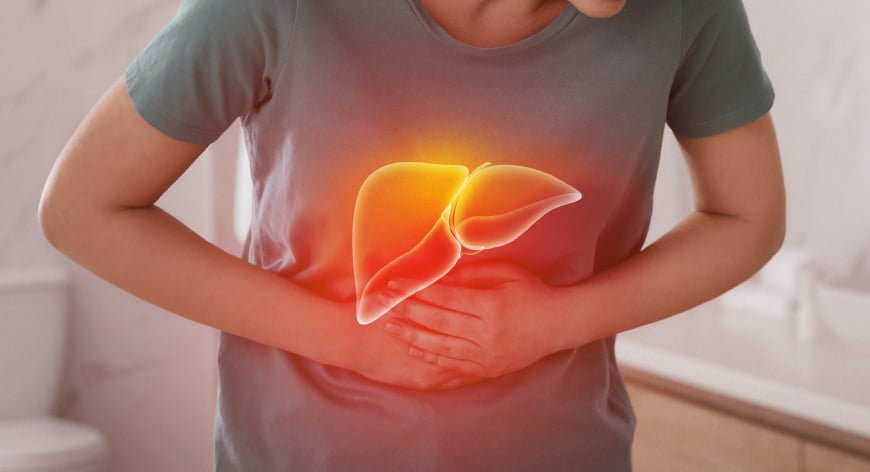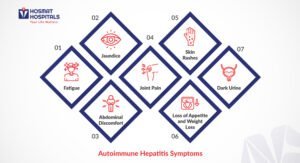
What is Autoimmune Hepatitis?
Autoimmune hepatitis is a chronic liver disease caused by the immune system attacking healthy liver cells. This attack leads to inflammation, damaging the liver over time and impairing its function. While the exact cause of this mistaken identity remains unknown, researchers believe a combination of genetic and environmental factors plays a role.
Autoimmune hepatitis has two main types:
- Type 1: This is the more common type, affecting people of all ages, but more frequently in women between the ages of 20 and 40.
- Type 2: This type primarily affects young women and children. It’s often associated with other autoimmune diseases like Sjögren’s syndrome or primary biliary cholangitis.
Causes of Autoimmune Hepatitis
The exact cause of autoimmune hepatitis remains unclear. However, genetic, environmental, and immunological factors are believed to contribute to its development.
- Genetic Factors: Certain genes involved in immune system regulation may predispose individuals to autoimmune hepatitis. A family history of autoimmune diseases can increase the risk.
- Environmental Triggers: Exposure to certain viruses, drugs, or toxins might trigger the autoimmune response in genetically susceptible individuals.
- Immunological Factors: Dysregulation of the immune system, which fails to distinguish between self and non-self, plays a crucial role in the pathogenesis of autoimmune hepatitis.
Risk Factors
Several factors can increase the likelihood of developing autoimmune hepatitis:
- Gender: Women are more commonly affected than men.
- Age: While autoimmune hepatitis can occur at any age, it is often diagnosed in individuals between the ages of 40 and 60.
- Family History: A family history of autoimmune diseases can elevate the risk.
- Coexisting Autoimmune Conditions: Individuals with other autoimmune disorders, such as type 1 diabetes, celiac disease, or rheumatoid arthritis, have a higher risk of developing autoimmune hepatitis.
Autoimmune Hepatitis Symptoms
The symptoms can vary widely, from mild to severe, and may develop gradually or suddenly. Common symptoms of Autoimmune Hepatitis include:
- Fatigue: Persistent tiredness is a hallmark symptom.
- Jaundice: Yellowing of the skin and eyes due to elevated bilirubin levels.
- Abdominal Discomfort: Pain or tenderness, particularly in the upper right side of the abdomen.
- Joint Pain: Often seen in conjunction with other autoimmune diseases.
- Skin Rashes: Unexplained rashes or skin changes.
- Loss of Appetite and Weight Loss: Reduced appetite leading to unintentional weight loss.
- Dark Urine: Darker than standard urine colour due to increased bilirubin excretion.
Autoimmune Hepatitis Treatments
Effective management of autoimmune hepatitis focuses on reducing liver inflammation, preventing further damage, and maintaining liver function. Treatment strategies include:
- Corticosteroids: Prednisone or budesonide are commonly used to reduce inflammation and suppress the immune system.
- Immunosuppressive Drugs: Azathioprine, mycophenolate mofetil, or tacrolimus may be prescribed to help control the immune response and minimize the need for long-term corticosteroid use.
- Liver Transplant: In severe cases where the liver is extensively damaged, and other treatments fail, a liver transplant may be necessary.
The treatment plan is tailored to the individual’s specific needs and the severity of the condition. Regular monitoring with blood tests and liver function tests is essential to assess the effectiveness of treatment and adjust medications as needed.
In some severe cases, liver transplantation might be considered as a last resort if the liver becomes critically damaged and fails to function correctly.
Diagnosis of Autoimmune Hepatitis
Diagnosing autoimmune hepatitis involves a combination of clinical evaluation, laboratory tests, and liver biopsy. Blood tests can reveal elevated liver enzymes, antibodies typical of autoimmune hepatitis (e.g., ANA, ASMA, anti-LKM1), and abnormal liver function. A liver biopsy can confirm the diagnosis by showing characteristic histological features such as interface hepatitis and lymphoplasmacytic infiltrates.
Living with Autoimmune Hepatitis
While autoimmune hepatitis is a chronic condition, it can be effectively managed with proper medical care and lifestyle modifications. Here are some tips for living well with autoimmune hepatitis:
- Medication adherence: Taking medications exactly as your doctor prescribes is crucial for controlling the disease.
- Healthy diet: Maintaining a balanced diet rich in fruits, vegetables, and whole grains ensures your body receives the essential nutrients.
- Regular exercise: Staying active with moderate exercise can improve overall health and well-being.
- Avoiding alcohol and hepatotoxins: Alcohol consumption can further damage the liver, so it’s best to abstain. Certain medications and herbal supplements can also be harmful to the liver.
Conclusion
Autoimmune hepatitis is a serious condition, but with proper diagnosis, treatment, and lifestyle adjustments, most people can lead full and productive lives. Detection and management at an early stage are essential to preventing complications.
For individuals navigating life with autoimmune hepatitis, remaining informed and proactive in managing their health can ease the journey. If you suspect you have symptoms related to this condition, consult Hosmat Hospitals, the best multi-speciality hospital in Bangalore, for a proper diagnosis and treatment plan.



